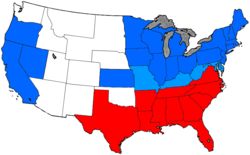 American Civil War
American Civil WarDuring this war 600,000 soldiers were killed and 80,000 civilians were killed or died from starvation. This is more than all the other wars combined. This is part of the history beginning at the Turning Point.
Turning Point
The Union victories at Gettysburg and Vicksburg in July, 1863, marked a definite turning point in the war. Both sides now had seasoned, equally valiant soldiers, and in Lee and Ulysses S. Grant each had a superior general. But the North, with its larger population and comparatively enormous industry, enjoyed a tremendous material advantage. Both sides also resorted to conscription, even though it met some resistance.
Under Stanton, successor to Simon Cameron, the overall administration of the Union army was more efficient. Problems of organization still remained, however, and Henry W. Halleck continued in the difficult role of military adviser, with the title of general in chief. The Joint Congressional Committee on the Conduct of the War, organized in Dec., 1861, attempted to influence the actions as well as the appointment of Union generals (its efforts were particularly strong on behalf of Hooker). The chairman, Benjamin F. Wade, was frequently at odds with Lincoln, and the committee’s investigations and high-handed actions lowered morale among the Union forces.
Grant and Sherman
On the Georgia-Tennessee line in Sept., 1863, Bragg, having temporarily halted his retreat, severely jolted the Federals, who were saved from a complete rout by the magnificent stand of George H. Thomas, the Rock of Chickamauga. Grant, newly appointed supreme commander in the West, hurried to the scene and, with William T. Sherman, Hooker, and Thomas's fearless troops, drove Bragg back to Georgia (Nov. 25). After Knoxville, occupied in September, withstood Longstreet's siege (Nov.–Dec.), all Tennessee, hotbed of Unionism, was now safely restored to the Union.
In Mar., 1864, Lincoln, for many years an admirer of Grant, made him commander in chief. Leaving the West in Sherman's capable hands, Grant came east, took personal charge of Meade's Army of the Potomac, and engaged Lee in the Wilderness campaign (May-June, 1864). Outnumbered but still spirited, the Army of Northern Virginia was slowly and painfully forced back toward Richmond, and in July the tenacious Grant began the long siege of Petersburg.
Although Jubal A. Early won at Monocacy (July 9), threatening the city of Washington, the Confederates were unable to repeat Jackson's successful diversion of 1862, and Philip H. Sheridan, victorious in the grand manner at Cedar Creek (Oct. 19), virtually ended Early's activities in the Shenandoah Valley. For his part, Sherman, opposed first by the wily Joe Johnston and then by John B. Hood, won the Atlanta campaign (May-Sept., 1864).
The Election of 1864
On the political front, a movement within the Republican party to shelve Lincoln had collapsed as the tide turned in the Union's favor. With Andrew Johnson
, Lincolm's own choice for Vice President over the incumbent Hannibal Hamlin, the President was renominated in June, 1864. The Democrats nominated McClellan, who still had a strong popular following, on an ambiguous peace platform (largely dictated by Clement L. Vallandigham, leader of the Copperheads), which the ex-general repudiated. Even so, Lincoln was easily reelected.
Lee's Surrender
After the fall of Atlanta, which had contributed to Lincoln's victory, Sherman's troops made their destructive march through Georgia. Hood had failed to draw Sherman back by invading Union-held Tennessee, and after the battle of Franklin (Nov. 30) Hood's army was almost completely annihilated by Thomas at Nashville (Dec. 15-16, 1864). Sherman presented Lincoln with the Christmas gift of Savannah, Ga., and then moved north through the Carolinas. Farragut's victory at Mobile Bay (Aug. 5, 1864) had effectively closed that port, and on Jan. 15, 1865, Wilmington, N.C., was also cut off.
After Sheridan's victory at Five Forks (Apr. 1), the Petersburg lines were breached and the Confederates evacuated Richmond (Apr. 3). With his retreat blocked by Sheridan, Lee, wisely giving up the futile contest, surrendered to Grant at Appomattox Courthouse (see under Appomattox) on Apr. 9, 1865. The surviving Confederate armies also yielded when they heard of Lee's capitulation, thus ending the conflict that resulted in over 600,000 casualties.
Aftermath
The long war was over, but for the victors the peace was marred by the assassination of Abraham Lincoln, the greatest figure of the war. The ex-Confederate states, after enduring the unsuccessful attempts of Reconstruction to impose a new society on the South, were readmitted to the Union, which had been saved and in which slavery was now abolished. The Civil War brought death to more Americans than did any other war, including World War II. Photographs by Mathew B. Brady and others reveal some of the horror behind the statistics. The war cost untold billions and nourished rather than canceled hatreds and intolerance, which persisted for decades. It established many of the patterns, especially a strong central government, that are now taken for granted in American national life. Virtually every battlefield, with its graves, is either a national or a state park. Monuments commemorating Civil War figures and events are conspicuous in almost all sizable Northern towns and are even more numerous in the upper South.




